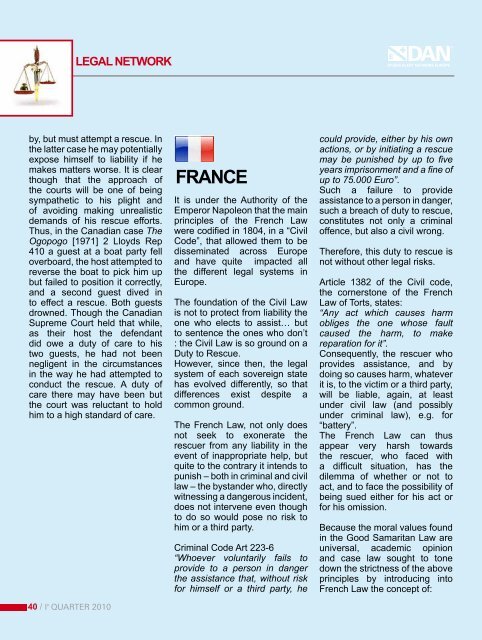Alert Diver - DAN Europe
Alert Diver - DAN Europe
Alert Diver - DAN Europe
You also want an ePaper? Increase the reach of your titles
YUMPU automatically turns print PDFs into web optimized ePapers that Google loves.
40 2 / /<br />
I FIRST 2010<br />
LEGAL NETWORK<br />
by, but must attempt a rescue. In<br />
the latter case he may potentially<br />
expose himself to liability if he<br />
makes matters worse. It is clear<br />
though that the approach of<br />
the courts will be one of being<br />
sympathetic to his plight and<br />
of avoiding making unrealistic<br />
demands of his rescue efforts.<br />
Thus, in the Canadian case The<br />
Ogopogo [1971] 2 Lloyds Rep<br />
410 a guest at a boat party fell<br />
overboard, the host attempted to<br />
reverse the boat to pick him up<br />
but failed to position it correctly,<br />
and a second guest dived in<br />
to effect a rescue. Both guests<br />
drowned. Though the Canadian<br />
Supreme Court held that while,<br />
as their host the defendant<br />
did owe a duty of care to his<br />
two guests, he had not been<br />
negligent in the circumstances<br />
in the way he had attempted to<br />
conduct the rescue. A duty of<br />
care there may have been but<br />
the court was reluctant to hold<br />
him to a high standard of care.<br />
FRANCE<br />
It is under the Authority of the<br />
Emperor Napoleon that the main<br />
principles of the French Law<br />
were codified in 1804, in a “Civil<br />
Code”, that allowed them to be<br />
disseminated across <strong>Europe</strong><br />
and have quite impacted all<br />
the different legal systems in<br />
<strong>Europe</strong>.<br />
The foundation of the Civil Law<br />
is not to protect from liability the<br />
one who elects to assist… but<br />
to sentence the ones who don’t<br />
: the Civil Law is so ground on a<br />
Duty to Rescue.<br />
However, since then, the legal<br />
system of each sovereign state<br />
has evolved differently, so that<br />
differences exist despite a<br />
common ground.<br />
The French Law, not only does<br />
not seek to exonerate the<br />
rescuer from any liability in the<br />
event of inappropriate help, but<br />
quite to the contrary it intends to<br />
punish – both in criminal and civil<br />
law – the bystander who, directly<br />
witnessing a dangerous incident,<br />
does not intervene even though<br />
to do so would pose no risk to<br />
him or a third party.<br />
Criminal Code Art 223-6<br />
“Whoever voluntarily fails to<br />
provide to a person in danger<br />
the assistance that, without risk<br />
for himself or a third party, he<br />
could provide, either by his own<br />
actions, or by initiating a rescue<br />
may be punished by up to five<br />
years imprisonment and a fine of<br />
up to 75.000 Euro”.<br />
Such a failure to provide<br />
assistance to a person in danger,<br />
such a breach of duty to rescue,<br />
constitutes not only a criminal<br />
offence, but also a civil wrong.<br />
Therefore, this duty to rescue is<br />
not without other legal risks.<br />
Article 1382 of the Civil code,<br />
the cornerstone of the French<br />
Law of Torts, states:<br />
“Any act which causes harm<br />
obliges the one whose fault<br />
caused the harm, to make<br />
reparation for it”.<br />
Consequently, the rescuer who<br />
provides assistance, and by<br />
doing so causes harm, whatever<br />
it is, to the victim or a third party,<br />
will be liable, again, at least<br />
under civil law (and possibly<br />
under criminal law), e.g. for<br />
“battery”.<br />
The French Law can thus<br />
appear very harsh towards<br />
the rescuer, who faced with<br />
a difficult situation, has the<br />
dilemma of whether or not to<br />
act, and to face the possibility of<br />
being sued either for his act or<br />
for his omission.<br />
Because the moral values found<br />
in the Good Samaritan Law are<br />
universal, academic opinion<br />
and case law sought to tone<br />
down the strictness of the above<br />
principles by introducing into<br />
French Law the concept of:














